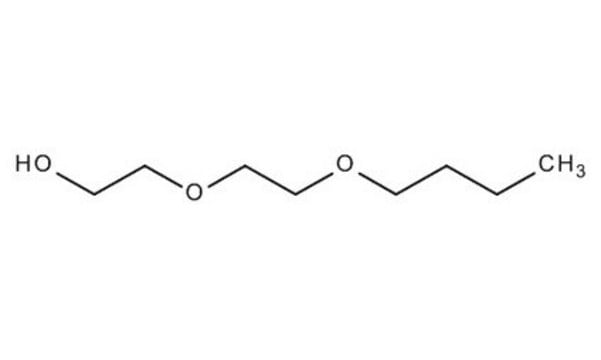579963
Diethylene glycol butyl ether
≥99%
Sinónimos:
Butyl CARBITOL™, 2-(2-Butoxyethoxy)ethanol, BDG, Butyldiglycol
About This Item
Productos recomendados
vapor density
5.6 (vs air)
vapor pressure
30 mmHg ( 130 °C)
assay
≥99%
form
liquid
autoignition temp.
400 °F
expl. lim.
6.2 %
refractive index
n20/D 1.432 (lit.)
pH
7
bp
231 °C (lit.)
mp
−68 °C (lit.)
density
0.967 g/mL at 25 °C (lit.)
application(s)
hematology
SMILES string
CCCCOCCOCCO
InChI
1S/C8H18O3/c1-2-3-5-10-7-8-11-6-4-9/h9H,2-8H2,1H3
InChI key
OAYXUHPQHDHDDZ-UHFFFAOYSA-N
¿Está buscando productos similares? Visita Guía de comparación de productos
General description
Application
- Factors Affecting the Adsorption of Per- and Polyfluoroalkyl Substances (PFAS) by Colloidal Activated Carbon.: This study investigates the adsorption characteristics of PFAS by colloidal activated carbon, with a specific focus on the role of various solvents including diethylene glycol butyl ether. The research highlights the solvent′s effectiveness in enhancing adsorption efficiency (Hakimabadi et al., 2023).
- First Stage of the Development of an Eco-Friendly Detergent Formulation for Efficient Removal of Carbonized Soil.: This research explores the formulation of eco-friendly detergents, demonstrating the use of diethylene glycol butyl ether as a key solvent for effective soil removal. The study underscores its potential in creating sustainable cleaning products (Fernandes et al., 2022).
Legal Information
signalword
Warning
hcodes
Hazard Classifications
Eye Irrit. 2
Storage Class
10 - Combustible liquids
wgk_germany
WGK 1
flash_point_f
210.2 °F - closed cup
flash_point_c
99 °C - closed cup
ppe
Eyeshields, Gloves, type ABEK (EN14387) respirator filter
Certificados de análisis (COA)
Busque Certificados de análisis (COA) introduciendo el número de lote del producto. Los números de lote se encuentran en la etiqueta del producto después de las palabras «Lot» o «Batch»
¿Ya tiene este producto?
Encuentre la documentación para los productos que ha comprado recientemente en la Biblioteca de documentos.
Los clientes también vieron
Nuestro equipo de científicos tiene experiencia en todas las áreas de investigación: Ciencias de la vida, Ciencia de los materiales, Síntesis química, Cromatografía, Analítica y muchas otras.
Póngase en contacto con el Servicio técnico














